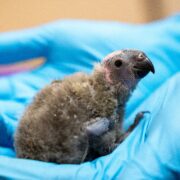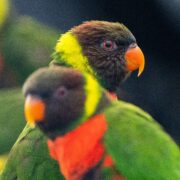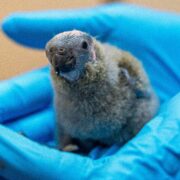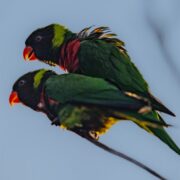Two extremely rare baby birds have hatched at the zoo in what conservationists say could be a “pivotal moment” for the species.
The precious parrots, known as Mitchell’s lorikeets, are one of the world’s rarest birds and face extinction in the wild. Zookeepers will determine the sex of the important new arrivals by testing DNA samples from their feathers.
The Mitchell’s lorikeet was once found on the Indonesian islands of Bali and Lombok, but latest searches have found only a handful of birds remaining. In 2020, a group of conservationists set out on an expedition to find the last remaining populations and recorded only seven birds living in Bali.
Extensive hunting and trapping for the illegal wildlife trade has driven the drastic decline in numbers and, as a result, the species is listed as Endangered by the International Union for the Conservation of Nature (IUCN) and BirdLife International. The two chicks will join a breeding programme for the species, which was set up to form a vital safety-net population in conservation zoos across Europe.
“The hatching of two Mitchell’s lorikeet chicks is pivotal moment for the species, especially as its future on the planet hangs in the balance. Given how precious the chicks are, we’ve been monitoring them very closely and weighing the duo regularly to give them every chance of fledging the nest and reaching adulthood – they really are very special.”
Zoe Sweetman, Parrot Team Manager at the zoo.
Zoe continued to say:
“The unrelenting pace of the illegal wildlife trade has pushed the species to the edge of existence, so in 2018 Chester joined an important conservation breeding programme where every new addition is helping to protect the future of the species. We’re now home to 12 of these beautiful parrots, which is sadly more than what has been recorded in the wild in recent years.”
More than a million birds are taken from the wild each year for illegal wildlife trade, which operates across the continent. The market is being driven by a culture of keeping and giving birds as gifts, where the rarer or more colourful birds are the most highly prized.
The illegal wildlife trade is now the fourth largest international crime and threatens the future of tens of thousands of species globally.
Andrew Owen, Head of Birds at the zoo, added:
“Many of Indonesia’s bird have now largely disappeared from their forest homes. This is why we’ve been working with our partners in Java, the Cikananga Conservation Breeding Centre, for more than a decade to rescue birds and provide the skills to breed them in their own country. Part of this work also includes working with local communities to try and change the culture from trapping birds, to helping protect them, which is a huge task in itself.
“In the case of the Mitchell’s lorikeet, it will be the role of conservation zoos like ours to provide a safe haven for the birds and, through specialised breeding programmes, secure their future and help bring them back from the brink.”
Chester Zoo has both financed and lent its expertise to its partners in Indonesia, the Cikananga Conservation Breeding Centre, for a decade to protect the future of the birds in their homeland and creating safety-net populations of the region’s most highly threatened species.



